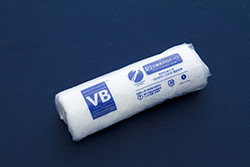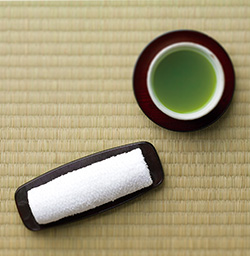Meet Japanese Companies with Quality
Reinventing the oshibori Fujinami Towel Service Co., Ltd.
Website: Fujinami Towel Service Co., Ltd.![]()
Category: Japanese Design & Daily goods
A cloth of culture
To walk into a restaurant in Japan is a cultural experience in itself. Guests are treated to a rousing round of welcomes, guided to their seats, and greeted with an oshibori-rolled-up wet towels (or alternately, folded wet napkins in little packets) for the customer to clean and refresh themselves with. The same can generally be expected in Japanese hotels, salons and even corporate offices. Fujinami Towel Service, Co., one of Japan's leading oshibori manufacturers, has come to play an important role in introducing the world to this aspect of Japanese culture.
Founded in 1967, Fujinami has established itself as an innovative and reliable supplier of the towels to a myriad of industries worldwide. This is largely due to their high quality line of products and their rental service, through which Fujinami loans out oshibori to over 6,000 hotels, restaurants and medical facilities, while personalizing the towels to suit clients' needs. As such, Fujinami boasts a high profile clientele including Estée Lauder, Facebook and Google's Japan offices. Fujinami has also branched out to luxury scented paper towels, Bijoux "Hand Spa" towelettes, soaps, chopsticks and towel sterilizing machines.

Director of Fujinami Towel Service, Tsutomu Inuzuka

Fujinami's VB ("Virus Block") oshibori
Virus block
The demand for Fujinami's towels primarily lies in its high caliber of sanitation, an aspect that distinguishes it from other oshibori manufacturers. The company is the only in the game that utilizes VB ("Virus Block"), a technology invented by Keio University's medical department in collaboration with Fujinami. The VB formula has been proven to help eliminate 99.9 percent of bacteria per application, thereby helping protect against influenza, MRSA and other diseases. These anti-bacterial factors have gained popularity among increasingly health-conscious and germophobic consumers, rendering Fujinami towels a staple in hospitals and nursing homes.
Omotenashi
The handing out of oshibori isn't merely a hygienic practice but an intrinsic part of omotenashi, literally meaning "no agenda," a Japanese social ritual to foster good relationships between companies and their clients. "An oshibori alone is a white, rolled-up towel," states Tsutomu Inuzuka, the director of Fujinami Towel Service, adding that what gives it relevance is the role it plays in omotenashi-the Japanese culture of expressing hospitality to guests and clients. "The purpose of oshibori in Japan is to thank customers for visiting and make them feel that they are in good hands. It needs to have a healing effect."
As such, Inuzuka stresses the importance of a towel's texture and aroma, carefully selecting thread and paper types, detergents and fragrances. Of Fujinami's selection of eight herbal and citrus scents, the exotic hinoki, or Japanese cypress, is the most popular among foreign customers. If cleanliness is indeed next to godliness, then Japan is a step closer to paradise, with Fujinami at the helm.

The Japanese art of hospitality
Website: Fujinami Towel Service Co., Ltd.![]()



